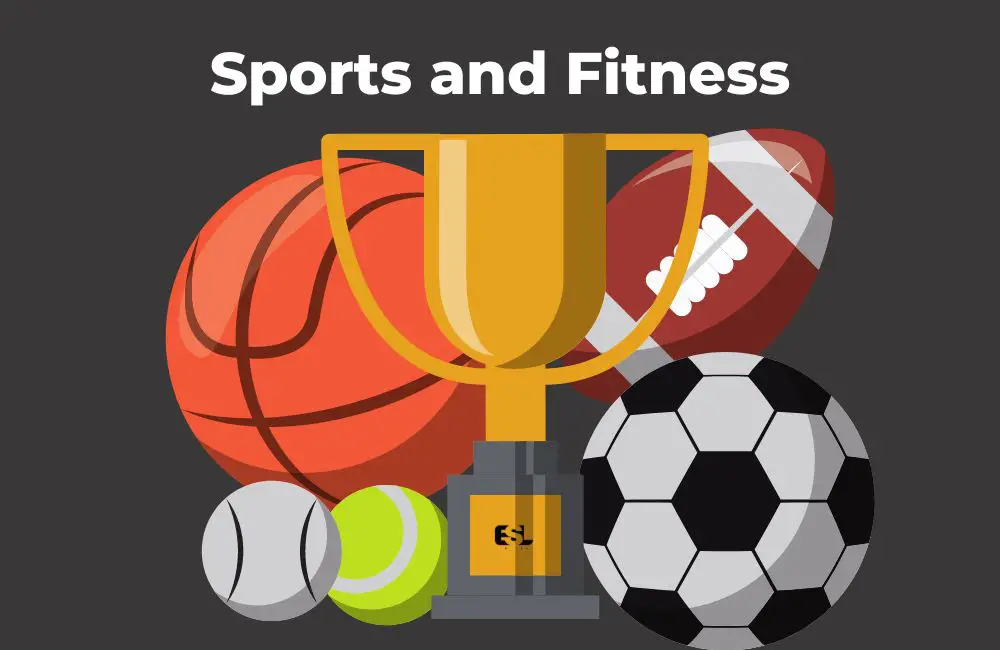Engaging in sports and fitness activities is not only beneficial for physical health, but also helps build community, teaches perseverance, and promotes mental wellbeing. Whether you are an athlete, a sports fan, a fitness enthusiast, or someone trying to lead a more active lifestyle, the following sports and fitness vocabulary will enable you to express yourself more clearly and understand others better in related contexts.
Table of Contents
- 1. General Sports Terms
- 2. Fitness and Gym Terms
- 3. Soccer (Football) Vocabulary
- 4. Basketball Vocabulary
- 5. Running and Marathon Vocabulary
- 6. Tennis Vocabulary
- 7. Yoga Vocabulary
- Sample Conversation: Using Vocabulary Related to Sports and Fitness
- Conclusion
- FAQ: Vocabulary for Sports and Fitness
1. General Sports Terms
These are the basic terms used in various sports and physical activities.
| Word/Phrase | Meaning/Usage | Example Sentences |
|---|---|---|
| Team | A group of players working together in a sport | “The team trained hard for the upcoming match.” |
| Coach | A person who trains and directs athletes | “The coach devised a new strategy for the next game.” |
| Referee | A person who enforces the rules in a game | “The referee blew the whistle for a foul.” |
| Score | The number of points gained in a sport | “The score was tied at the end of the game.” |
| Penalty | A punishment given by a referee for breaking a rule | “The player received a penalty for unsportsmanlike conduct.” |
| League | A group of sports teams that compete against each other | “Their team is currently leading the league.” |
| Champion | A person or team that wins a competition | “She was crowned the champion of the tennis tournament.” |
| Sportsmanship | Fair and respectful behavior in sports | “Good sportsmanship is just as important as winning.” |
| Endurance | The ability to continue doing something difficult for a long time | “Running a marathon requires great endurance.” |
| Stamina | Physical or mental energy needed to do a long and difficult activity | “Boxing requires both strength and stamina.” |
To elevate your vocabulary in just 30 days, I recommend to my students an informative, fun, and accessible guide to utilizing powerful language. Millions of individuals have enhanced their academics, job skills, and confidence by dedicating just fifteen minutes daily to the exercises and tests of 30 Days to a More Powerful Vocabulary (Amazon Link), a top-selling. It offers step-by-step methods to bolster language prowess, discover compelling words, and daily vocabulary enhancement with pronunciation guidance.
2. Fitness and Gym Terms
These are the words you need to know for those who frequent the gym or partake in fitness exercises.
| Word/Phrase | Meaning/Usage | Example Sentences |
|---|---|---|
| Cardio | Exercises that increase heart rate and improve heart health | “She does cardio three times a week.” |
| Strength Training | A type of physical exercise that uses resistance to induce muscular contraction | “Strength training can help increase muscle mass.” |
| Repetition (Rep) | One complete motion of an exercise | “Do ten repetitions of each exercise.” |
| Set | A group of repetitions | “I do three sets of push-ups in my workout routine.” |
| Warm-up | Light exercises to prepare the body for a workout | “Always do a warm-up before starting your exercise routine.” |
| Cool Down | A period of low-impact exercise following intense exercise | “A cool down helps your heart rate return to normal gradually.” |
| Personal Trainer | A professional who helps individuals achieve their fitness goals | “Her personal trainer designed a workout routine specifically for her.” |
| Circuit Training | A form of body conditioning using high-intensity aerobics and resistance training | “Circuit training can improve muscle strength and cardiovascular endurance.” |
| Interval Training | A type of training that involves a series of high-intensity workouts interspersed with rest or relief periods | “Interval training can boost metabolism and improve cardiovascular fitness.” |
| Pilates | A physical fitness system developed in the early 20th century | “Pilates emphasizes alignment, breathing, and developing a strong core.” |
3. Soccer (Football) Vocabulary
Soccer, known as football in many countries, is the most popular sport in the world. Here are some common terms associated with it.
| Word/Phrase | Meaning/Usage | Example Sentences |
|---|---|---|
| Goal | The area between the posts that a ball must enter to score a point | “He scored a goal in the last minute of the game.” |
| Offside | A rule violation when a player is nearer to the opponent’s goal than the ball at the moment it is played | “The referee called an offside.” |
| Free Kick | A kick awarded for a foul, taken by a player from the spot where the offense occurred | “He scored from a free kick.” |
| Penalty Kick | A kick awarded for a foul committed inside the penalty area | “The penalty kick decided the outcome of the match.” |
| Goalkeeper | The player whose main role is to prevent the ball from entering the goal | “The goalkeeper made an incredible save.” |
| Defender | A player whose main role is to stop the opposing team’s players from scoring | “The defender blocked the shot on goal.” |
| Midfielder | A player generally positioned in the middle of the field between the defenders and the forwards | “The midfielder controlled the pace of the game.” |
| Forward | A player whose main role is to score goals | “The forward scored two goals in the match.” |
| Corner Kick | A free kick from the corner of the field, given when the ball has been sent over the goal line by a player on the defensive team | “They scored a goal from a corner kick.” |
| Dribble | The act of controlling the ball while running | “He dribbled past the defenders and scored.” |
4. Basketball Vocabulary
As a widely played and watched sport, basketball has its own unique set of terms.
| Word/Phrase | Meaning/Usage | Example Sentences |
|---|---|---|
| Jump Ball | A method used to start or resume play in basketball | “The game began with a jump ball.” |
| Free Throw | A shot from the free-throw line as a result of a foul | “He made both of his free throws.” |
| Slam Dunk | A shot in which a player thrusts the ball forcefully down through the basket | “The crowd cheered at his impressive slam dunk.” |
| Layup | A shot taken close to the basket that is usually banked off the backboard towards the basket | “He missed an easy layup.” |
| Rebound | To gain possession of the ball after a missed shot | “She got the rebound and quickly passed it to a teammate.” |
| Three-Pointer | A shot made from beyond the three-point line | “He made a crucial three-pointer in the last seconds of the game.” |
| Foul | An illegal action that can result in a free throw or the possession of the ball | “He was called for a foul after pushing an opponent.” |
| Dribble | To bounce the ball while moving | “He dribbled the ball up the court.” |
| Pick-and-roll | An offensive strategy involving two players without the ball | “They executed a perfect pick-and-roll.” |
| Block | A defensive play in which a player legally deflects a field goal attempt from an opponent | “He blocked the shot, denying the opposing team a point.” |
5. Running and Marathon Vocabulary
Running, including marathon running, is one of the most accessible sports. Here are the terms often used in the running community.
| Word/Phrase | Meaning/Usage | Example Sentences |
|---|---|---|
| Pace | The speed at which someone runs | “She set a steady pace for the marathon.” |
| Sprint | To run at full speed over a short distance | “He sprinted the last 100 meters.” |
| Jog | To run at a gentle pace | “She jogs every morning for 30 minutes.” |
| Marathon | A long-distance running race, traditionally 42.195 kilometers | “He is training for his first marathon.” |
| Finish Line | The line that marks the end of a race | “Crossing the finish line was an exhilarating experience.” |
| Personal Best (PB) | A person’s best time in a race | “She set a new personal best in the race.” |
| Hydrate | To drink enough fluids, especially water | “Remember to hydrate during the race.” |
| Endorphins | Chemicals released in the brain while running that make you feel happier | “Running helps to release endorphins and boost your mood.” |
| Interval Training | Training in which short, high-intensity intervals are alternated with longer, slower intervals | “Interval training can improve your speed and endurance.” |
| Runner’s High | A feeling of euphoria that some people feel after running for a long distance | “After the race, he experienced a runner’s high.” |
6. Tennis Vocabulary
Tennis is a sport with a rich vocabulary. Understanding these terms can enhance your enjoyment and understanding of the game.
| Word/Phrase | Meaning/Usage | Example Sentences |
|---|---|---|
| Ace | A serve that the opponent is unable to reach, resulting in a point | “She scored an ace on her first serve.” |
| Backhand | A stroke played with the back of the hand facing the ball | “He has a strong backhand.” |
| Deuce | A score of 40-40 in a game | “The game went to deuce several times.” |
| Double Fault | Two consecutive serving faults in a point, causing the server to lose the point | “A double fault at a crucial moment cost him the game.” |
| Love | A score of zero | “The score is now 40-love.” |
| Match Point | A point that, if won by the player in the lead, will win the match | “She has two match points.” |
| Net | The central barrier on a tennis court | “He hit the ball into the net.” |
| Rally | An extended exchange of shots between players | “They had a long rally before she won the point.” |
| Serve | The stroke used to start each point | “He has a powerful serve.” |
| Volley | A shot hit before the ball bounces | “She won the point with a quick volley.” |
7. Yoga Vocabulary
Yoga is not only a form of exercise, but also a spiritual practice. Here are some common yoga terms.
| Word/Phrase | Meaning/Usage | Example Sentences |
|---|---|---|
| Asana | The physical postures practiced in yoga | “The instructor demonstrated the asana before we tried it.” |
| Pranayama | Breathing exercises in yoga | “We practiced pranayama at the start of the class.” |
| Namaste | A respectful greeting or farewell in yoga | “We say namaste at the end of each yoga class.” |
| Savasana | The “corpse pose”, usually the final pose in a yoga class | “Savasana allows for relaxation and integration of the practice.” |
| Vinyasa | A style of yoga characterized by stringing postures together so that you move from one to another, seamlessly | “Vinyasa yoga is dynamic and flowing.” |
| Chakra | The energy centers in the body according to yoga tradition | “We focused on opening the heart chakra today.” |
| Mantra | A word or sound repeated to aid concentration in meditation | “We chanted the mantra ‘Om’ during meditation.” |
| Mudra | Symbolic hand gestures used in yoga and meditation | “The teacher showed us the Gyan Mudra for wisdom.” |
| Yogini | A female practitioner of yoga | “She is a dedicated yogini.” |
| Sun Salutation | A series of yoga poses performed in a continuous flow, often at the beginning of a yoga session | “We started the session with a few rounds of Sun Salutations.” |
If you are searching for an effective English language vocabulary builder, try Word Power Made Easy: The Complete Handbook for Building a Superior Vocabulary (Amazon Link). This time-tested classic has helped millions achieve mastery of English and improve their communication skills in business, the classroom, and in life.
Sample Conversation: Using Vocabulary Related to Sports and Fitness
Situation: At a local park, after finishing their morning run, Tara and Jake stretch while discussing their fitness routines and favorite sports.
Tara: Jake, I’ve noticed you’ve been incorporating more “sprints” into your “jogging” routine. Is that for “interval training”?
Jake: Absolutely, Tara! I read that “high-intensity interval training” (HIIT) can boost “stamina” and improve “cardiovascular” health. Plus, it’s a great way to mix things up.
Tara: I’ve been thinking of joining a “yoga” class for “flexibility” and “core strength.” Do you think it would complement my “aerobic” exercises?
Jake: Definitely. Yoga not only enhances flexibility but also helps in “muscle toning” and mental relaxation. I’ve also been dabbling in “weightlifting” at the gym for “muscle mass.”
Tara: Sounds intense! Oh, by the way, are you participating in the upcoming “triathlon”?
Jake: I am! It’s a combination of “swimming,” “cycling,” and “running.” I’ve been following a strict “training regimen” for it. You should give it a shot someday!
Tara: Maybe next year. For now, I’m focused on “badminton” tournaments. It’s such a great “racquet sport” for agility.
Conclusion
From running marathons to practicing yoga, sports and fitness activities enrich our lives in countless ways. They also come with their own distinct languages. Understanding the vocabulary related to sports and fitness not only helps us communicate more effectively in these domains, but also deepens our engagement with the activities we love.
So the next time you lace up your running shoes, step onto the yoga mat, or cheer for your favorite team, remember the power of words in amplifying your experience.
FAQ: Vocabulary for Sports and Fitness
1. What is “interval training”?
“Interval training” involves alternating between high-intensity exercise bursts and rest or low-intensity periods, aiming to improve speed and cardiovascular fitness.
2. How does “yoga” benefit one’s health?
“Yoga” is a mind-body practice that combines physical poses, controlled breathing, and meditation to enhance physical and mental well-being, flexibility, and strength.
3. What is the difference between “jogging” and “sprinting”?
“Jogging” is a moderate-paced running, typically done over longer distances, while “sprinting” is running at full speed over short distances.
4. How does “weightlifting” impact the body?
“Weightlifting” involves lifting weights to increase muscle strength and size. It can improve bone density, boost metabolism, and enhance overall fitness.
5. Why is “cardiovascular” fitness important?
“Cardiovascular” fitness relates to the efficiency of the heart, lungs, and blood vessels. Good cardiovascular health reduces the risk of heart disease, improves lung capacity, and supports overall fitness.
6. What is a “triathlon”?
A “triathlon” is a multi-stage competition involving three continuous and sequential endurance disciplines, usually swimming, cycling, and running over various distances.
7. How does “aerobic” exercise differ from “anaerobic” exercise?
“Aerobic” exercises, like jogging or swimming, rely on oxygen and improve cardiovascular endurance. “Anaerobic” exercises, like sprinting or weightlifting, are short-duration, high-intensity activities that enhance muscle strength and power.
8. What benefits does playing a “racquet sport” offer?
“Racquet sports” like tennis, badminton, or squash enhance agility, hand-eye coordination, reflexes, and provide a full-body workout.
9. How essential is a “training regimen” for athletes?
A “training regimen” provides structured and specific exercises tailored to improve performance in a particular sport, ensuring that athletes remain in optimal condition.
10. Why is “core strength” vital in fitness?
“Core strength” refers to the muscles around the trunk and pelvis. A strong core provides stability, supports posture, and is essential for most physical activities.






